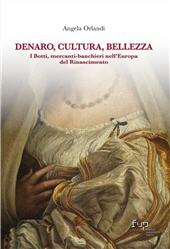Denaro, cultura, bellezza : i Botti, mercanti-banchieri nell'Europa del Rinascimento
209 p. : ill.
The history of the Botti is both family biography and an account of a Florentine company that was present on the most important economic markets of the first half of the sixteenth century (Florence, Pisa, Cádiz, Seville, Venice, Valladolid, Rome, Antwerp and Lyon). Their enduring commercial activity abroad and the intensity of their economic relations beyond their home city fostered encounters of different cultures. They were protagonists of an intercultural exchange which on the strength of a solid foundation of money and finance spread the taste for beauty and Florentine Renaissance culture. They contributed to the realisation of the 'Florence factor', which is held to be the precursor of the 'Italy factor', namely the ability to produce attractive things appreciated throughout the world.
Not only did the Botti family use their wealth, artistic taste and culture to grow economically, they also played a role in making their city an essential point of reference for the Italian Renaissance, thus benefiting artists as well. Their commercial earnings allowed them to assemble a splendid collection of artworks, which the last member of the family, Matteo di Giovanbattista, left to the Medici; these works included Raphael's La Velata, reproduced here on the cover. Angela Orlandi teaches economic history in the Department of Economics and Management of the University of Florence. Her scholarly interests include public and private finance, business history and international trade between the Middle Ages and the early modern era. She is scientific director of the "F. Datini" International Foundation for Economic History in Prato. [Publisher's text]
Biografia familiare, storia di un gruppo aziendale fiorentino, quello dei Botti, che nella prima metà del XVI secolo fu presente nelle più importanti piazze economiche dell'epoca (Firenze, Pisa, Cadice, Siviglia, Venezia, Valladolid, Roma, Anversa, Lione). Le lunghe permanenze all'estero e l'intensità dei rapporti economici fuori patria facilitarono l'intersezione della famiglia con mondi diversi. I Botti divennero attori di un commercio interculturale che, sostenuto dal denaro e dalla finanza, consentì di diffondere il gusto del bello e la cultura del Rinascimento fiorentino. Contribuirono alla realizzazione di quel 'Fattore Firenze' ritenuto il precursore del 'Fattore Italia', ossia la capacità di fare cose belle che piacciono al mondo. Non solo, i Botti usarono la ricchezza, il gusto e la cultura per crescere economicamente, contribuendo a fare della loro città un punto di riferimento imprescindibile dell'epoca, anche favorendo gli artisti.
Il denaro guadagnato con la mercatura consentì loro di creare una splendida collezione di opere d'arte che l'ultimo della famiglia, Matteo di Giovanbattista, lasciò ai Medici, come La Velata di Raffaello qui riprodotta in copertina. Angela Orlandi insegna Storia economica nel Dipartimento di Scienze per l'Economia e l'Impresa dell'Università di Firenze. I suoi interessi scientifici riguardano la finanza pubblica e privata, la business history e il commercio internazionale tra Medioevo ed Età Moderna. È direttrice scientifica della Fondazione Istituto Internazionale di Storia Economica "F. Datini" Prato. [Testo dell'editore]
-
Information
ISBN: 9791221505009
SERIES


